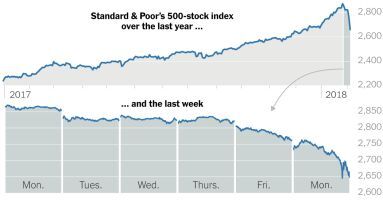That market volatility influences market activity, can be understood when it is realised that markets are driven by a number of factors, none the least of which are supply, demand, liquidity and price. With prices rising and falling by dramatic amounts in short periods of time (volatility); and liquidity created by such market action, investors who are strategically managing their portfolio will take the opportunity to sell shares on reaching their target sale price, on the rise; and to buy shares that have fallen to a price that gives them a buy-signal (action).
As a stark reminder as to how consistently market volatility influences investment activity, we feature the following extract* from an article we posted in our website Library in that most sensitive of volatile months in recent memory, August 2011. That month triggered a considerable level of anxiety amongst investors (including superannuation fund members/ account holders) as they were still sensitive to significant market falls less than three years out from the depths of the GFC.
The reference below, to being ‘consistent with earlier communications’, is to an article that was posted in February that year, titled “Investment risk and volatility“: that article is also something of an evergreen (or at least cyclically relevant).
Market volatility influences and effects
*”We have started another week of market trading and anybody within earshot of a radio or TV or in sight of any print media will be aware that the value of the share markets has seriously declined over the past few days – and that volatility (and volume of trade) is high.
Most of our readers will have heard the explanations being given for the downwards movement in the share markets, but not all will be aware that the US Bond markets have risen during this time. That movement begs the question then: if the US downgrade is such a catastrophic event, why are people flocking to buy bonds from a downgraded government treasury?
Consistent with earlier communications, we need to think about what is happening here – and the result is that this downturn is being driven more by negative sentiment than by economic fundamentals. Our take on the matter (after taking in some of the comments from visitors on Bloomberg TV and local economic and market analysts in Australia) is that the following has developed –
- Initial fear has given way to panic which, then feeding on itself, gave way to deep panic;
- Typical of these markets, the huge volumes of trade are being undertaken by traders and retail investors – the Institutional investors are taking a much more subdued approach;
- Market fundamentals, based on earnings and earnings forecasts are in stark contrast with the valuation now reflected in the markets;
- Forced selling through margin calls on portfolios with inappropriate (in the circumstances) levels of borrowing – or panic by geared investors recalling the experiences of the 2008 crisis of confidence fuels some of the selling;
- Shares are in deep value territory now and will recover quite strongly once the panic selling stops.
We stand with our clients and encourage calm in the current situation. For those with even a hint of some nerve (and some as yet unfulfilled investment strategy goals), be ready to take advantage of this situation as soon as the market settles. This settling could take several weeks – but it could also be over within days: the important considerations will be –
- Re-enter the market after the dust settles;
- Only invest monies that were in the original strategy; and
- Invest in the knowledge that it will be with a long-term perspective.
As always, we welcome calls from clients with particular concerns – and reassure clients for whom such events are nerve-racking that we are sensitive to your feelings and will try to get timely advice to you to deal with those concerns.“
We are here to help
The experienced advisers at Continuum Financial Planners Pty Ltd are here to help you capitalise on situations where market volatility influences investment activity – and your investment portfolio should benefit from such activity where your goals and objectives are clearly understood, you are investing according to a defined strategy; and you regularly review the progress of your portfolio towards financial goals and objectives set to a clear time frame.
To make an appointment with one of our team – and to experience the value of working with a professional financial planner who puts your best interests first and foremost (as has been our practice since incorporation in 2003), please phone our office (on 07-3421 3456), or complete the Contact Us form on our website (and be assured of a prompt response).
(Originally posted in August 2011, this article has been absorbed into a new post in October 2018: it has occasionally been refreshed and updated, most recently in September 2020.)


